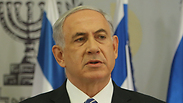
Netanyahu. 'Held indirect talks with Hamas while weakening PA'
צילום: ירון ברנר
PM showed terror groups road to success
Op-ed: Instead of blaming Abbas and Kerry, Netanyahu must take full responsibility for his part in collapse of security perception he has been leading in past few years.
Regardless of anyone's political views about the future of Jewish settlements, Israelis are united at this time in their concern for the three missing teens – as well as in the understanding that in the bleeding region we live in we have only ourselves to rely on, and it doesn't matter which borders we are living in.
The heart of the dispute, and the harsh criticism directed at Prime Minister Benjamin Netanyahu, stem from his decisions to free thousands of Palestinians from prison in exchange for the release of kidnapped and captive soldiers.
As the person who freed Hamas leader Sheikh Ahmed Yassin at the time, and then negotiated with Hamas and released from than 1,000 murderers in return for kidnapped IDF soldier Gilad Shalit, he cannot deny that he gave terror organizations a serious boost of encouragement to try to abduct additional Israelis, both soldiers and civilians. With his own hands, he showed them the road to success.
Netanyahu pointed an accusing finger at Palestinian Authority Chairman Mahmoud Abbas, and expressed his disappointment at the international community's weak response to the abduction of the three teens. But even at this time, we are allowed – and it is even our duty – to demand that the prime minister take full responsibility for his part in the collapse of the security perception he has been leading in the past few years.
The wholesale release of prisoners and indirect talks with Hamas, while weakening the Palestinian Authority, are direct products of his policy.
The prime minister's regular pattern of placing the responsibility for any failure on the international community (for example, in the issue of Iran turning into a nuclear threshold state) or raising odd demands in the talks with the Palestinians and then blaming Abbas, have led to the fact that in the past two days the entire army is pursuing one terror cell and many Israelis are living in fear of abduction, while the world prefers to continue watching the World Cup.
If we are responsible for our fate, as Netanyahu and Defense Minister Moshe Ya'alon said Saturday, what do they want from Abbas and from American Secretary of State John Kerry?
The cabinet convened Saturday evening for an unusual meeting: For the first time since the current government's establishment, the cabinet was joined by ministers who have not been exposed in the past to strategically significant discussions.
Although Netanyahu and Ya'alon bring a lot of experience and the ability to exercise the required caution, Ministers Yair Lapid and Naftali Bennett will likely be required in the coming days to voice their opinions and influence crucial decisions involving human lives.
When the crisis ends, and I hope the missing teens will return safely to their families, we will face the real test: Will we draw the historic conclusions, which will outline the direction for setting Israel's borders and for a thorough and fundamental treatment of the roots of the conflict which is poisoning our relation with our neighbors? Will we finally understand that behind this individual cell there are millions of Palestinians who will never give up on their desire to live in freedom, in liberty and separately from us?










